![]()
Open Soft Robotics Platforms
– How soft technologies can enhance our daily life? –
International Workshop at the Conference on soft robotics 2018.
Livorno, Italy — April 24, 2018.
Link : http://www.robosoft2018.org/workshops.html
The workshop has been success!
Thank you for your participation.
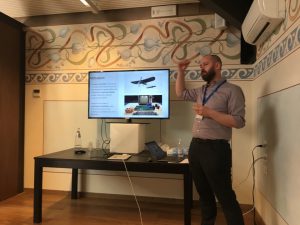
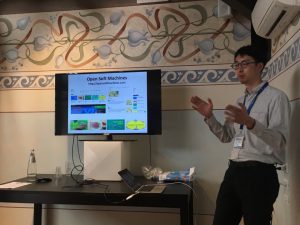
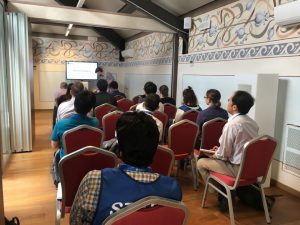
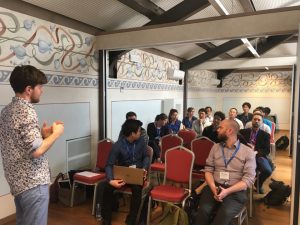
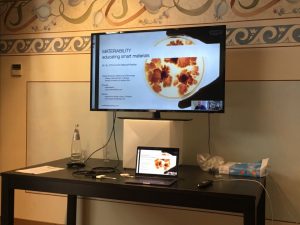
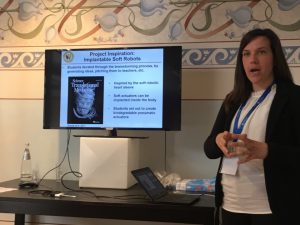
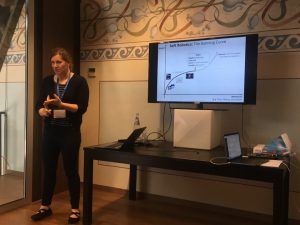
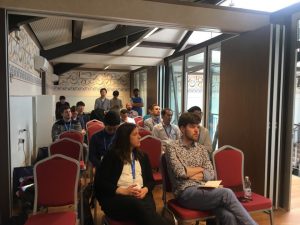
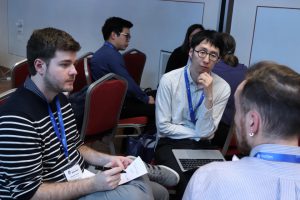
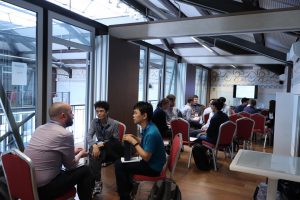
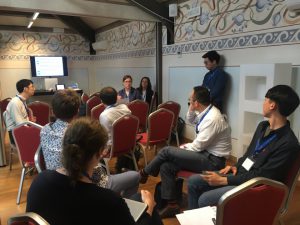
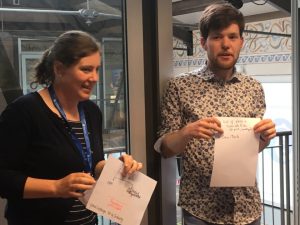
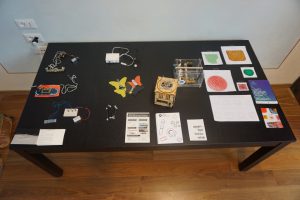
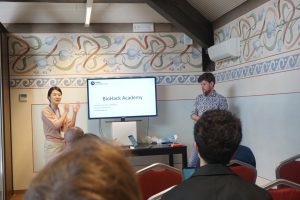
Information shared at WS
INVITED SPEAKER – Slides
1. Soft Robotics Toolkit : Donal Holland (Director, Soft Robotics Toolkit)
Slides will be uploaded soon!
2. Open Soft Machines : Ryuma Niiyama (Director, Open Soft Machines)
Download File : Robosoft2018_OpenSoftMachines
3. Bio Hack Academy : Roland van Dierendonck (Director, Bio Hack Academy)
Slides will be uploaded soon!
4. Materiability : Manuel Kretzer (Director, Materiability)
Download File : Robosoft2018_Materiability
5. Utilizing the Soft Robotics Toolkit for STEM engagement in Secondary Schools : Holly Golecki (Educator, Haverford School)
Slides will be uploaded soon!
6. Soft Robotics: Too ‘Soft’ a field? : Josie Hughes (Researcher, Univ. of Cambridge)
Slides will be uploaded soon!
WORKSHOP – DISCUSSION – Topics
Topics that we discussed will be uploaded soon!
Information before WS
CALL FOR PARTICIPATIONS
In this workshop, we will share the knowledge on the open hardware platform. And also discuss how to seamlessly bridge those knowledge through hands-on workshop with your own research. Let’s make drawings of recipes together for each of your own research about soft materials/robots.

Part1 invited speakers – share the knowledge on the open hardware platforms

part2 Workshop – Drawing and Discussion ideas for the open hardware platform to explain your own research
TIME TABLE
List of invited speakers and Time Schedule.
Part1 Invited Speaker (14:00-16:10)
| 14:00-14:05 | Introduction : Young ah SEONG Open Soft Robotics Platforms |
|---|---|
| 14:05-14:25 | Soft Robotics Toolkit : Donal Holland (Director, Soft Robotics Toolkit) Soft Robotics Toolkit (http://www.softroboticstoolkit.com) is an online intellectual resource that has the specific purpose to enable technical literacy, build student confidence, and provide a means for people from all backgrounds to quickly develop their own innovative soft robots. This last year we launched a new section on the website specifically for the distribution of materials to educators, so that they may conduct their own workshops or classroom exercises. The new section includes four activities with printable step-by-step booklets, materials lists, as well as notes for instructors on how to conduct their own workshop. The toolkit website has had 1,300,000+ page views, users from 195 countries, 140,000+ users, 10,000 downloads and now has 300 average visits per day. In addition to create the online site to disseminate soft robotic materials, we have also used these materials as part of outreach activities such as public lectures and workshops. These materials have been used in over 10 lectures to over 200 public middle and high school students from the Greater Boston area, New York City, Ireland, India and Peru the majority of whom attend schools in low-income areas. Our team has also organized three rounds of competitions open to the public with over 650 people participating. These events lower the barrier of entry for those who would like to be involved in robotics and surveys are being developed to evaluate their impact. |
| 14:25-14:45 | Open Soft Machines : Ryuma Niiyama (Director, Open Soft Machines)
www.opensoftmachines.com
|
| 14:45-15:05 | Bio Hack Academy : Roland van Dierendonck (Director, Bio Hack Academy) The BioHack Academy is a ten week academy around designing and building laboratory devices using digital fabrication skills, utilizing open source hardware designs, and using these devices for creative biology experiments. Partcipants learn about laboratory working techniques, and work with living materials. The Academy is distributed globally: lectures are live streamed from Waag in Amsterdam, but participants abroad work at local partner labs. All materials are shared on an online syllabus, including guides to work with living materials. All hardware designs have their own Github repositories, which are open to fork, hack and improve. The fifth BioHack Academy was from January to April 2018, and edition six will start at the beginning of 2019. |
| 15:05-15:10 | 5min Break Time |
| 15:10-15:30 | Materiability : Manuel Kretzer (Director, Materiability) abstract |
| 15:30-15:50 | Utilizing the Soft Robotics Toolkit for STEM engagement in Secondary Schools : Holly Golecki (Educator, Haverford School) Educators seek problems and projects that engage students in developing creativity and critical thinking skills. The Soft Robotics Toolkit (SRT) enables this engagement through an online community of tutorials and authentic engineering challenges. With the step-by- step tutorials provided by the SRT, students in K12 schools are equipped to begin applying their scientific knowledge to build devices and solve real world problems. At The Haverford School (THS) in Haverford, PA, USA, the SRT is used by an extracurricular robotics club and as part of the curriculum in an engineering elective course. The club allows students to spend many months iterating through the design, build, test process to arrive on an engineering solution that soft robotics can solve and to enter their ideas into the SRT competition. Last year at THS, 8 students proposed developing a biodegradable, pneumatic actuator. Their goal was to create actuators that can be both sold as an interactive candy product for children and also inform the design of implantable, biocompatible soft robotic devices. The SRT competition guided them through the process of identifying the problem, building their device, and documenting their methods. By the end, they had experienced the entirety of an authentic engineering project. This year at THS, 35 more students elected to take an engineering course based on the SRT. The provided tutorials allow for students to experiment as they familiarize themselves with the soft robotics field. Then, students can expand to create new methods of forming actuators, compliant versions of athletic braces, and aquatic devices capable of locomotion while they observe practical applications of chemistry, biology, and physics. The potential is demonstrated here by a specific case study but the resources and associated cost make SRT accessible to any K12 school. The open source nature of the SRT allows for educators to easily implement authentic design challenges in the classroom to develop critical thinking, collaboration, and communication skills. |
| 15:50-16:10 | Soft Robotics: Too ‘Soft’ a field? : Josie Hughes (Researcher, Univ. of Cambridge) The low barrier to entry and holistically motivated techniques of soft robotics have spurred rapid growth in the field over recent years by allowing for quick design and testing. But is this less traditional approach to robotics sustainable? What is required to carry on from here? This talk addresses the learning curve for soft robotics, the training or learning required to address the key remaining challenges and the enabling technologies or approaches. It will explore the required training, tools kits and academic landscape to generate the next generation of soft robotics. |
Coffee Break (16:10-16:30)
Part2 Workshop (16:30-18:00)
| 16:30-17:30 | Group Workshop and Discussion |
|---|---|
| 17:30-17:50 | Share |
| 17:50-18:00 | Closing |
TOPICS
- Various approaches on open hardware platforms
- Who is your target users and how do you design your platform to encourage them?
- How seamlessly bridge these platforms and knowledge for various targets?
- How open platforms for soft robotics can enhance our daily life?
(Social Impact, Values in Real World, Applications as Services or Products) - Soft robotics for education
- Hands-on soft robotics projects/workshops/classes
- DIY recipes for soft robotics
- Communication tools/platforms for open hardware
- Catalog/review of soft robotics techniques
- Various experiences for soft robotics
- Affordable actuators and sensors
- Starter kit for soft robotics
- Printable robots
- Digital fabrication for soft robotics, Advantages of 3D printer
- Design tools for robot design, Computer-aided approach
- Simulation for soft-bodied Robots
- Soft robotics technologies for art and design
MOTIVATION
In recent years, as an open hardware platform on soft robot, the approach has been diversified from tutorials for beginners to projects for business. These platforms have different purposes, such as education, research and development, and they all are expected to share the knowledge and enhance our daily life.
In this workshop, we will discuss the followings and more to amplify and maximize the effect of platforms. First, we will share what each platform has done so far, for example, features, knowhow, impact on society, contribution to the field, etc. Second, we will discuss how to seamlessly bridge those knowledge on soft robot and materials. With respect of each platform’s approach and features, while trying hard at the goal of each platform, it is important to complement the functions to broaden communities across the designers, engineers, scientists and makers. Finally, what could be built further in cooperation not only the level of information? For example, developing kit and standardized WS methodology for education, or consulting for companies to provide enterprise production solutions could be considered.
Through these discussions, we think that we can get an inspiration, explore the possibilities and broaden the future prospects of the soft robot fields.
INVITED SPEAKERS
Donal Holland
Donal Holland is an Assistant Professor in Biomechanics at the UCD School of Mechanical Materials Engineering and an Associate at the Harvard School of Engineering and Applied Sciences. His research interests include soft robotics, wearable robotics, and engineering design education. He led the development of the Soft Robotics Toolkit (http://softroboticstoolkit.com/), an online design resource for students and researchers.
Ryuma Niiyama
Ryuma Niiyama is an Assistant Professor, Department of Mechano-Informatics at the University of Tokyo. He is a researcher in robotics. He has tried to understand theory of supple movement and softness of creature, and creating engineering mechanisms out of those learning. He is trying to expand the function and possibility of robotics. He is working on developing ‘bio-inspired’ robotics that is using artificial muscle. Also working on technology to print robots inexpensively. Creating autonomous material inspired by soft robotis is also his topic. He is interested in the harmony between morphology and computation in animal behaviors. Moreover, he has been keeping up active interest in the connection between human and machines. The methodology is making robot and demonstration of performance of the robot.
Manuel Kretzer
Manuel Kretzer is currently visiting professor at the Braunschweig University of Art, leading and teaching the subject ‘Digital Crafting’ as part of the newly founded course ‘Design in a Digital Society.’ His research aims at the notion of a soft and dynamic architecture with a specific focus on new (smart) material performance. He is the initiator of the materiability research network, a free educational community platform that attempts to connect architects, designers and artists and provides access to cutting edge new material developments.
Roland van Dierendonck
Roland van Dierendonck currently leading the BioHack Academy ( http://waag.org/biohack ), also maintaining the online syllabus environment on Github ( http://biohackacademy.github.
Roland has a MSc. in Media Technology at Leiden University and a BSc. in Bèta-gamma, specialization in Biology, at the University of Amsterdam.
Holly Golecki
Holly Golecki is a faculty of Haverford School.
Josie Hughes
Josie Hughes is a PhD student in the Bio-Inspired Robotics Lab at the University of Cambridge. Her work spans sensor morphology and technologies, the utilisation of 3D printing methods to develop soft robotics and the creation of complex passive soft robotics systems. She is particularly interested in the importance of mechanical design and materials in achieving varying behaviours in soft robotics.
ORGANIZERS
The University of Tokyo
Youngah SEONG is a Project Researcher of ERATO Kawahara Universal Information Network Project. Her work focuses around HCI, especially human emotion, communication and behavior.
Ryuma Niiyama is an Assistant Professor, Department of Mechano-Informatics at The University of Tokyo. He has tried to understand theory of supple movement and softness of creature, and creating engineering mechanisms out of those learning.
Yoshihiro Kawahara is an Associate Professor, Department of Information and Communication Engineering at The University of Tokyo. His research interests are in the areas of Computer Networks and Ubiquitous and Mobile Computing.
Harvard University
Conor J. Walsh is the John L. Loeb Associate Professor of Engineering and Applied Sciences at the Harvard John A. Paulson School of Engineering and Applied Sciences and a Core Faculty Member at the Wyss Institute for Biologically Inspired Engineering. He is passionate about educating future innovators.
University College Dublin
Donal Holland is an Assistant Professor in Biomechanics at the UCD School of Mechanical Materials Engineering and an Associate at the Harvard School of Engineering and Applied Sciences. His research interests include soft robotics, wearable robotics, and engineering design education. He led the development of the Soft Robotics Toolkit (http://softroboticstoolkit.com/), an online design resource for students and researchers.

